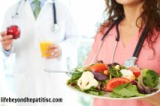
When living with hep C or another liver disease, patients can often feel like they have no control to make their life better. There are four key dietary steps for hep C and liver disease which help liver function.
Diet plays a key role in our health and can help the liver to function better. What we consume is in our hands and control. What we eat matters. We can help our liver function better by changing what we eat and drink.
We live in a world of over processed, quick fix, junk food and dashboard deli diets. But, this is not a good diet, especially for someone with hep C or liver disease. The right balance of nutrients affects the way our bodies function. Proteins normally help the body repair tissue. Over consummation of protein can cause problems with someone with liver disease.
In people with compromised liver function, proteins are not properly processed. Waste and toxic products can build up and affect the brain, causing high ammonia levels to rise and interfere with brain function.
Certain amounts of proteins are necessary for our body to function, so it is important not to limit in excess. The body needs a certain amount of amino acids from proteins that are essential in cell production and function. But, the key is balance.
4 Key Dietary Steps for Hep C and Liver Disease that Will Help Your Liver:
- Cut down on the amount of protein you eat. This will help limit the buildup of toxic waste products. This is very helpful for someone who has compromised liver functions and cirrhosis.
- Increasing your intake of carbohydrates to be in proportion to the protein you eat. Eat fresh fruits and vegetables and whole grains (not processed).
- Taking vitamins and medicines prescribed by your doctor for low blood count, nerve problems or nutritional problems from liver disease. Take vitamin supplements, especially B-complex vitamins and vitamin C. Patients with cirrhosis may be taking necessary prescription medications to reduce ammonia levels or for other conditions. Make sure to continue ALL prescribed medications from your physician unless they have advised otherwise.
- Limit your salt intake. Don’t just limit the salt that add to food by way of the saltshaker - limit the type of food that is high in sodium. Many processed foods, junk foods as well as others are loaded with high sodium. Be mindful and intentional about low sodium options. Salt in the diet may worsen fluid buildup and swelling in the liver. Reduce the amount of salt you consume, typically less than 1500 milligrams per day, especially if you retaining fluid. High sodium intake can make liver complications and symptoms worse. Talk with your liver specialist about the amount of sodium that is best for your liver condition.
This entry was originally published on
Life Beyond Hepatitis C February 17, 2015. It is reprinted with permission.








Comments
Comments